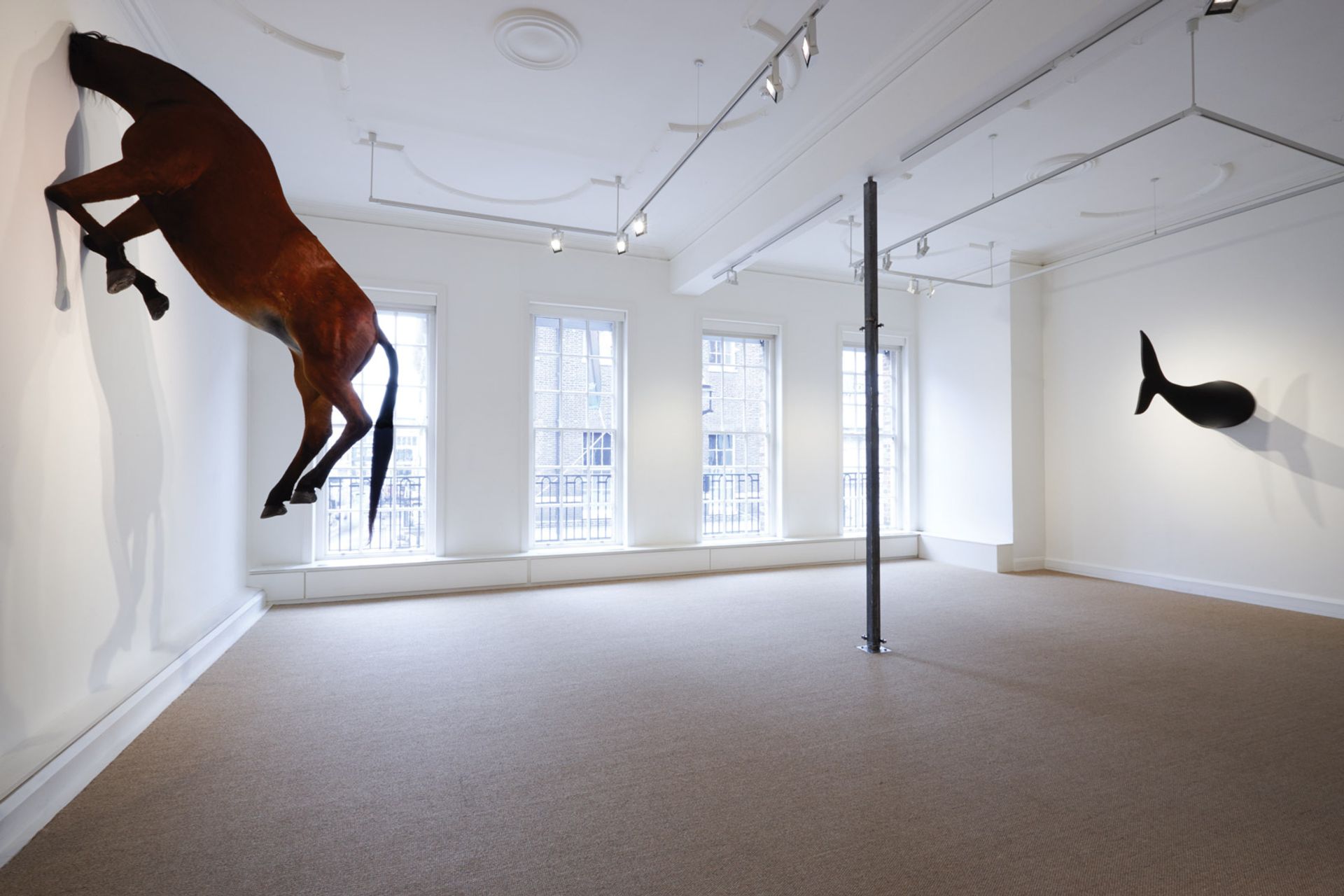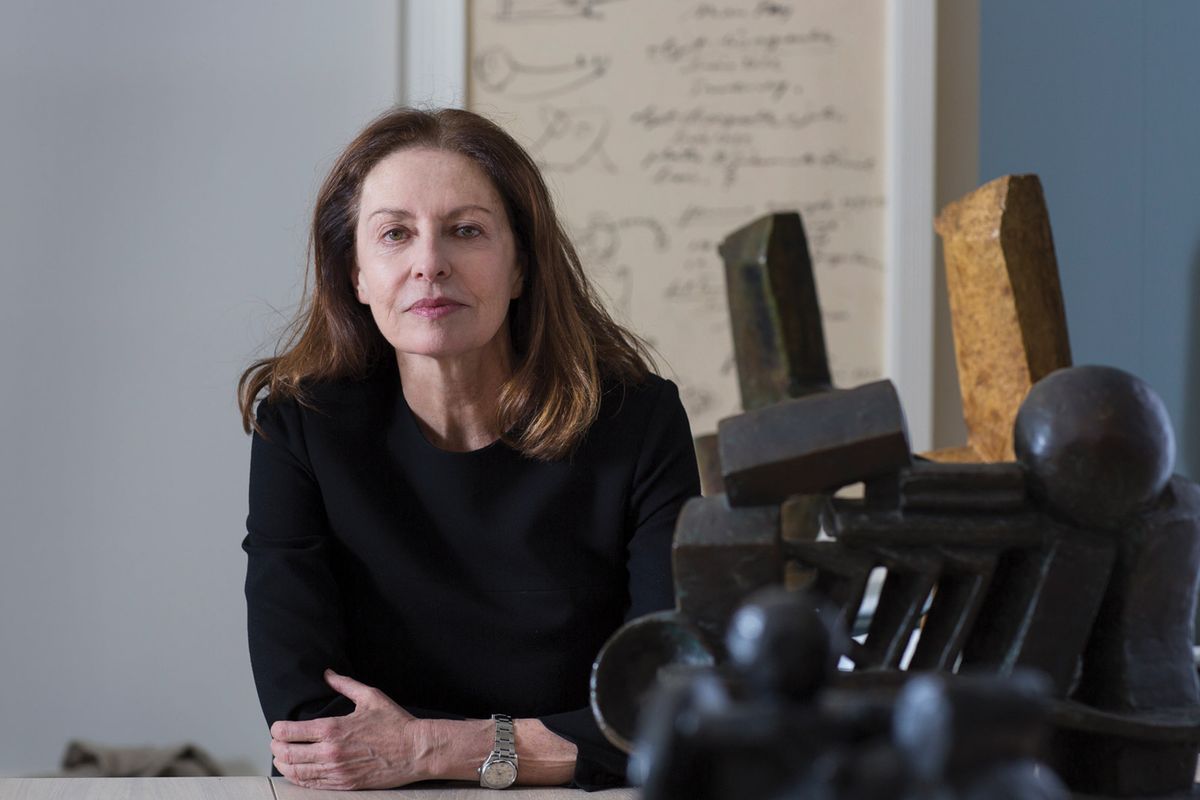Daniella Luxembourg admires stubbornness. It is a word she returns to repeatedly between bites of croissant, dipped elegantly in her morning cappuccino. Stubbornness, married with determination, gets things done. She would not suffer the apathetic: “I like people to have a point of view,” she says.
“We are all stubborn, opinionated, passionate women,” she says of her business partners Amalia Dayan and her own daughter Alma, who together make up the London and New York-based gallery Luxembourg & Dayan. They are “three Israeli girls” who speak Hebrew between themselves, she says.
Luxembourg & Dayan’s domestically proportioned space on Mayfair’s Savile Row is softened by sisal carpet, a rarity amid the hard-edged gallery aesthetic. Arriving to interview Luxembourg in November, the gallery was hung with the Reconstructing Cezanne show (which closed on 7 December). It was an exhibition that Luxembourg was initially against doing (“what more is there to say on Cezanne?”, she thought), but a stubborn Alma persuaded her, she says with a proud smile.
Luxembourg grew up in Israel, “an isolated community” culturally, she says, but “through literature, I got into the world”. With both literature and art, she says, “you really have to concentrate in order to enter into it, so that its world opens up for you.” She is now a long way from that cultural isolation, with an apartment (a “set”) at the Albany complex in Mayfair, mere steps from the gallery and adjoining the Royal Academy of Arts.
After starting her career in Israeli museums, she was approached to launch Sotheby’s Israel in 1984. It was a challenge (“Israel had never had auction houses before”), but being a lone wolf suited her—so much so that when Sotheby’s transferred her to Switzerland, she left after three years. “Once you come to Geneva or to London, you’re part of a big machine. It didn’t suit my character.”
She left the auction house in 1996 and started dealing with Simon de Pury, also formerly of Sotheby’s. In 2001, Bernard Arnault approached the pair about merging De Pury Luxembourg with Phillips auction house, recently bought by Arnault’s company LVMH. “It was quite a turbulent time politically, just after 9/11,” Luxembourg says. “They were confusing times, the early 2000s. I think today we are also approaching confusing times, but back then no one was expecting it.” She admits it was a “very difficult” experience: “In hindsight, it was not the right time to do it.”
LVMH pulled out of the business in 2002, selling its stake to Luxembourg and de Pury. Luxembourg left a year later, first dealing independently before co-founding Luxembourg & Dayan in 2009—Dayan had worked alongside her at Phillips de Pury Luxembourg and found the Mayfair space by chance. De Pury and Luxembourg remain on good terms—he describes her as “one of the grandes dames of the art world”. She has, he adds, “a very good eye”, with the ability to “focus on what she wants” and make it happen. “Daniella exudes great charm and warmth and, while being very professional, combines it all with an excellent sense of humour,” he says.
More thought, less noise
Luxembourg is not one to rush her answers. When asked what qualities it takes to be a good art dealer, she pauses, then says: “In order to assess a situation, like our time now, you have to look at everything, but then try to digest it slower because you have to be in it, but also think about it and have a certain point of view.” The contemporary art market has never been so rich and diverse, she says: “So you have to try and study before you talk. Less noise.” She is not a big fan of fairs as “art needs intimacy”, she thinks. “We learn things through being intimate with them, but intimacy is missing in modern society.”

High impact: Maurizio Cattelan’s Untitled and Pino Pascali’s Coda di Delfino in the 2016 Melodrama show at the gallery co-founded by Daniella Luxembourg © Will Amlot
Unprompted, she raises the subject of women and the rise in interest in female artists today. “It’s the right thing: women were ignored for such a long time,” she says, but then adds: “I look at you young women around me with concern, because although we believed in the 60s and 70s that everything was possible and there was no ceiling to stop us rising, the ceiling is still above our heads in many places.”
In democratic societies, she points out, female museum directors are more often replaced by men than the other way around, and while “more socialist countries” such as Israel have problems of their own, “there are more possibilities for women to grow”. While many commercial galleries, like her own, are led by women, “they have often founded it themselves, with their own money. That’s something different than being elected by the public.” She continues: “We get the same healthcare as men, the same rights, we vote, we are 50% of the population, and yet we don’t have 50% of the power in any sense.”
We get on to the relationship between commercial galleries, which Luxembourg thinks is coloured by New York’s thirst for the new in contrast to London’s penchant for “the known repertoire”. In the UK, she says, “the galleries that are very friendly with each other are the Old Master and British galleries—male friendships. And we are foreigners, so we’re not part of that. In America, it’s much more collegiate and straightforward.”
Brexit has, she says, already affected London galleries, as “a huge amount of [private] collections have already left England. It has become poor, unfortunately, in works of art—culturally impoverished.” Yet Luxembourg is a committed anglophile. “Are you English?” she asks. Yes, I reply. “OK, so you may not see it, but there is a basic civil structure to business and to yourself. I love being in a country that has such a structure. Things are protected, respected.” A gallery in Europe after Brexit is not on the horizon, for now. Luxembourg likes a small team and “another place in Paris or Milan means another 10 or 20 people. It’s very difficult to keep the same quality.” Should Amalia or Alma wish to open a European space, though, she would not stand in their way.
Worrying times
I ask Luxembourg, who was a founding director of the Jewish Museum in Vienna from 1989 to 1991, if she notices rising anti-semitic sentiment in the UK. She says not personally: “With the name Luxembourg, nobody thinks I’m Jewish. And the art world is fairly democratic in that respect.”
Yet anti-semitism and racism worry her: “You cannot live today and read what is on social media without thinking about it. Politically, we are facing difficult times.”
With regards to the art market, as much contemporary art is “so expensive”, she sees a shift in interest to overlooked corners of Modern art, pointing to the Tate’s show of Nam June Paik. That said, the gallery’s next London show, opening in February, is of a contemporary artist, the Brooklyn-based Derrick Adams (he is the only artist the gallery represents—jointly with Salon 94). Transformers is Adams’s first paintings show in Europe and it is, says Luxembourg, “Amalia’s baby—she is very tuned into the contemporary scene.”
Can dealers be tastemakers? “Some of them are. But you see it only in hindsight. You don’t know it when you do it yourself.” She points to many in the past: Iris Clert in Paris in the 1950s, Sidney Jannis (the “biggest champion of European post-war art in America in the 70s”), Virginia Dwan (“she brought Pop art to LA”) and Pierre Matisse (“he didn’t make much money but he was the first to show Giacometti in New York”).
The secret of happiness is to follow your true character. Read, observe, listen and never stop absorbing
Luxembourg, who will be 70 this year, has no regrets “because I feel that I can still do it”. After a characteristic pause, she offers some advice: “A wonderful woman, much older than me, once told me that the secret of happiness is to follow your true character. Read, observe, listen and never stop absorbing.”
A cliché perhaps, but Luxembourg is adamant that “art really does matter”. That explains why, when she moved to London, a little lonely, every Saturday she would go to sit in front of Manet’s A Bar at the Folies-Bergère in the Courtauld. “You look at it and think, there is hope for humanity,” she says. “So, if you can go back to a work of art, again and again, and say it really matters—that’s it, that’s why you do what you do.”
Biography
• Born in 1950 in Israel. Lives in London
• Co-founded Sotheby’s Israel in 1984 and was deputy chairman of Sotheby’s Switzerland from 1993-96
• President and co-owner of Phillips, de Pury & Luxembourg from 2001-04, backed by LVMH Group
• Co-founded Luxembourg & Dayan gallery in 2009, based in New York and London and specialising in post war and contemporary art


